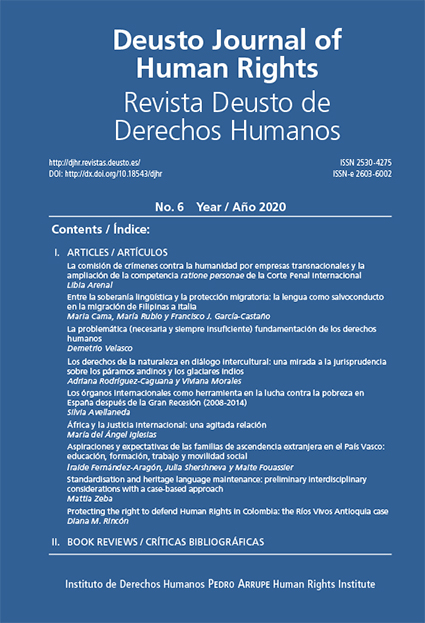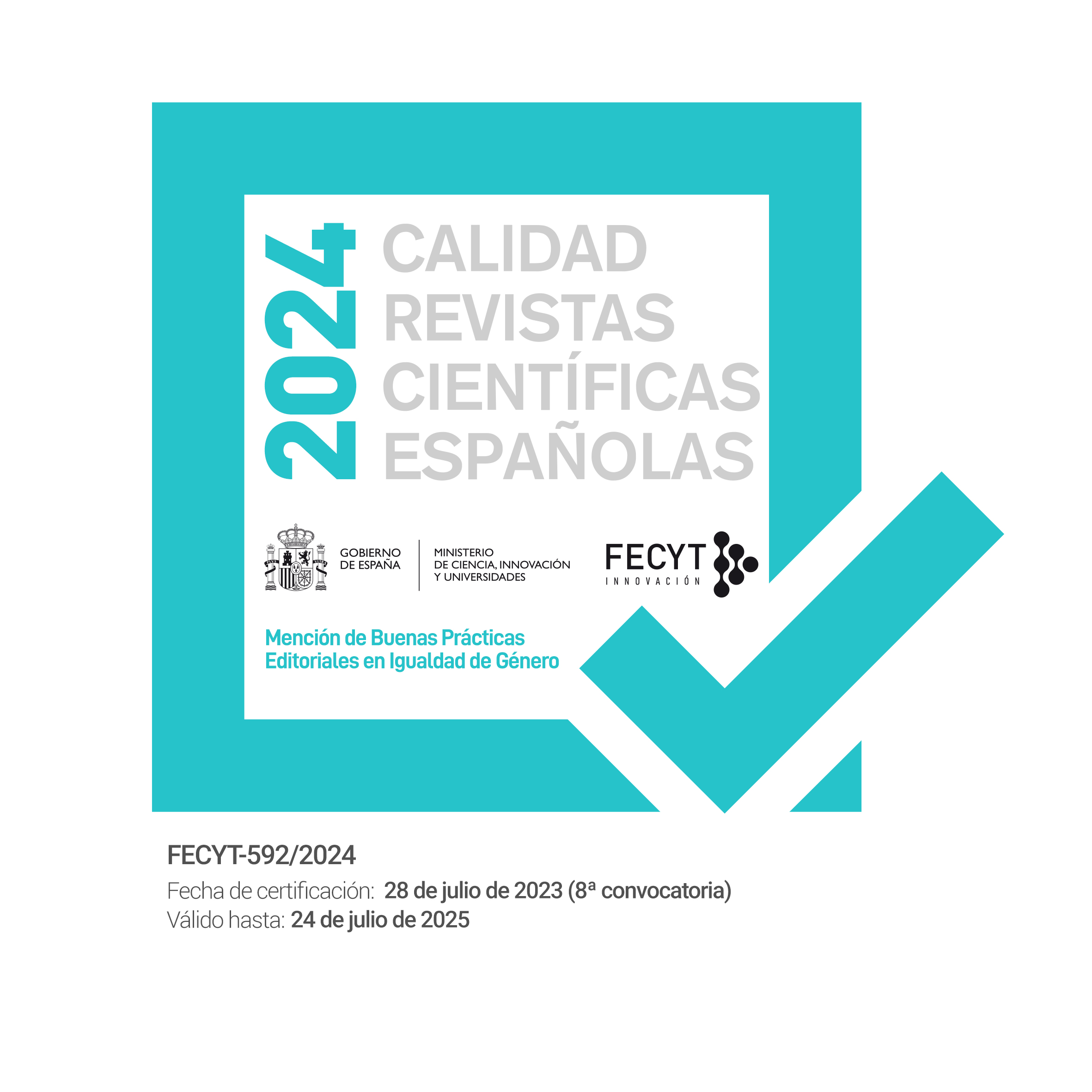The commission of crimes against humanity by transnational corporations and the extension of the jurisdiction ratione personae of the International Criminal Court
Abstract
Can transnational corporations commit crimes against humanity and be investigated and prosecuted by the International Criminal Court (ICC)? This article intends to provide an answer to this question by analyzing the legal possibilities and obstacles that could be found in the application of the Rome Statute of the ICC. First, the article examines whether corporations could meet the requirements established by the recent jurisprudence of the ICC in order to be considered as the concept of “organization” stated in art. 7 of the Rome Statute (RS), complying with the political element of crimes against humanity, and being criminally responsible for these crimes in international law. Secondly, it addresses the extension of the jurisdiction ratione personae of the ICC to include the legal person, specifically corporations, taking into consideration the legal arguments emanating from international law, the ICC system and criminal law.
Received: 03 February 2020
Accepted: 21 September 2020
Published online: Articles in Press 23 October 2020
Downloads
References
Alija, Rosa A. 2011. La persecución como crimen contra la humanidad, Barcelona: UB.
Ambos, Kai. 2008. «Note on article 25», Commentary on the Rome Statute of the International Criminal Court: Observer’s Notes, editado por Otto Trifferer, 743-770, Oxford: Hart Publishing.
Bartels, Rogier y Katharine Fortin. 2016. «Law, justice and a potential security gap: the ‘organization’ requirement in International Humanitarian Law and International Criminal law», Journal of Conflict and Security Law 21, n. 1: 1-20.
Bassiouni, Cherif. 2011. Crimes against humanity. Historical evolution and contemporary application, Nueva York: Cambridge University Press.
Benzing, Markus. 2003. «The complementarity regime of the International Criminal Court: international criminal justice between state sovereignty and the fight against impunity». Max Planck Yearbook of United Nations Law 7.
Bonet, Jordi. 2013. El derecho Internacional de los derechos humanos en periodos de crisis. Madrid: Marcial Pons.
Cassese, Antonio. 2003. International Criminal Law, Oxford: Oxford University Press.
Chiomenti, Cristina. 2006. «Corporations and the International Criminal Court», en Transnational Corporations and Human Rights, editado por Olivier De Schutter, 287-312, Oxford: Hart Publishing.
Clapham, Andrew. 2013. Human Rights Obligations of Non-States Actors, Oxford: Oxford University Press.
Coffee, J. C. 1981. «“No soul to damn: no body to kick”: an unscandalized inquiry into the problem of corporate punishment». Michigan Law Review 79, n. 3: 386-459.
Comisión de Derecho Internacional (CDI). 1996. Yearbook of the International Law Commission, vol. II, Second Part. Report of the Commission to the General Assembly on the work of its forty-eighth session. UN Doc. A/CN.4/SER.A/1996/Add.l, Part 2.
Comisión de Derecho Internacional (CDI). 2001. Anuario de la Comisión de Derecho Internacional. Vol. II, Parte 2. Informe de la Comisión a la Asamblea General sobre la labor realizada en su quincuagésimo tercer período de sesiones. A/CN.4/SER.A/2001/Add.1, Part 2.
Comisión de Derecho Internacional (CDI). 2019. Informe de la Comisión de Derecho Internacional 71er período de sesiones (29 de abril a 7 de junio y 8 de julio a 9 de agosto de 2019). Nueva York: Naciones Unidas: 10-154.
De Brabandere, Eric. 2011. «Non-state actors and human rights: corporate responsibility and the attempts to formalize the role of corporations as participants in the international legal system» en Participants in the International Legal System. Multiple Perspectives on Non-State Actors in International Law, editado por Jean D’Aspremont, 268-283, Abingdon: Routledge.
De Schutter, Olivier. 2006. Transnational Corporations and Human Rights, Studies in International Law. Oxford: Hart Publishing.
Di Fillipo, Marcello. 2008. «Terrorist crimes and international co-operation: critical remarks on the definition and inclusion of terrorism in the category of international crimes», European Journal of International Law 19: 533-570.
Donigan, Carrie-Lyn. 2000. «International legal mechanisms for combating organized crime: the need for a multilateral convention». Berkeley Journal of International Law 18, n, 1: 53-101.
Fraser, David. 2017. «(De)constructing the nazi State: criminal organizations and the Constitutional Theory of the International Military Tribunal», Loyola of Los Angeles International and Comparative Law Review 39: 117-186.
Geneuss, Julia, Jan P. Book, Boris Burghardt y Oliver Schüttpelz. 2010. «Core crimes Inc. Panel discussion reports from the Conference on “Transnational Business and International Criminal Law”», Journal of International Criminal Justice 8: 957-977.
Haigh, Kathryn. 2008. «Extending the International Criminal Court’s jurisdiction to corporations: overcoming complementarity concerns» Australian Journal of Human Rights 14, n. 1: 199-219.
Jørgensen, Nina. 2001. «A reappraisal of the abandoned Nuremberg concept of criminal organisations in the context of justice in Rwanda», Criminal Law Forum 12, n. 3: 371-406.
Kaeb, Caroline. 2016. «The shifting sands of corporate liability under international criminal law». The George Washington International Law Review 49: 351-403.
Kaleck, Wolfgang y Miriam Saage-MaaB. 2010. «Corporate accountability for human rights violations amounting to international crimes the status quo and its challenges». Journal of International Criminal Justice 8: 699-724.
Kremnitzer, Markus. 2010. «A possible case for imposing criminal liability on corporations in International Criminal Law», Journal of International Criminal Justice 8, n. 3: 909-918.
Kyriakakis, Joanna. 2008. «Corporations and the International Criminal Court: the complementarity principle stripped bare», Criminal Law Forum 19, n. 1: 115-151.
Márquez, Carmen. 2008a. El proceso de codificación y desarrollo progresivo de los crímenes contra la humanidad. Sevilla: Universidad de Sevilla.
Márquez, Carmen. 2008b. «Los elementos comunes de los crímenes de lesa la humanidad», Revista General de Derecho Penal 9: 1-56.
McAuliffe de Guzman, Margaret. 2000. «The road from Rome: The developing law of crimes against Humanity». Human Rights Quarterly 22: 335-403.
McCormack, Timothy y Susan Robertson. 2009. «Jurisdictional aspects of the Rome Statute for the new International Criminal Court», Melbourne University Law Review 23. Acceso el 25 de marzo de 2020. http://classic.austlii.edu.au/au/journals/MelbULawRw/1999/25.html
Moran, Clare F. 2014. «Human trafficking and the Rome statute of the international criminal court», The Age of Human Rights Journal 3: 32-45.
Moreno-Ocampo, Luis. 2003. Second Assembly of State Parties to the Rome Statute of the International Criminal Court, Report of the Prosecutor of the ICC. La Haya; Internacional Criminal Court.
Naucke, Wolfgang. 2015. El concepto de delito económico-político. Una aproximación, Madrid: Marcial Pons.
Oboka, Tomoya. 2005. «Trafficking of human beings as a crime against humanity: some implications for the international legal system», International and Comparative Law Quarterly 54, n. 2: 445-457.
Pérez Caballero, Jesús. 2015. El elemento político en los crímenes contra la humanidad. La expansión de la figura al crimen organizado transnacional y el caso de las organizaciones de narcotraficantes mexicanas en el sexenio 2006-2012, Madrid: Dykinson.
Pérez Manzano, Mercedes. 1999. Autoría y participación imprudente en el Código Penal de 1995, Madrid: Civitas.
Robinson, Allens A. 2008. Corporate Culture’ As A Basis for The Criminal Liability Of Corporations, prepared for the United Nations Special Representative of the Secretary General on Human Rights and Business. Acceso el 30 de marzo de 2020. https://media.business-humanrights.org/media/documents/f72634fd87adfd3d31a22f5f4b93150267b8a764.pdf
Robinson, Darryl. 2011. «Essence of crimes against humanity raised by challenges at ICC», Blog of the European Journal of International Law, EJIL Talk!, 27 septiembre.
Sadat, Leyla. 2013. «Crimes against Humanity in the Modern Age». The American Journal of International Law 107, n. 334: 1-94.
Schabas, William. 2008a. «General principles of criminal law in the International Criminal Court (Part III)». European Journal of Crime, Criminal Law and Criminal Justice 6, n. 4: 400-428.
Schabas, William. 2008b. «State policy as an element of international crimes», Journal of Criminal Law and Criminology 98, n. 3: 953-982.
Scheffer, David y Caroline Kaeb. 2011. «The five levels of CSR compliance: the resiliency of corporate liability under the Alien Tort Statute and the case for a counterattack strategy in compliance theory» Berkeley Journal of International Law 29: 334-397.
Scheffer, David. 2016. «Corporate liability under the Rome Statute». Harvard International Law Journal 57: 35-39.
Silva, Jesús M. (dir.). 2013. Criminalidad de la empresa y compliance. Prevención y reacciones corporativas, Barcelona: Atelier Libros Jurídicos.
Silva, Jesús M. 2016. Fundamentos del Derecho penal de la Empresa, Madrid: Edisofer.
Smith, Jennifer. 2009. «An international hit job: prosecuting organized crime acts as crimes against humanity», The Georgetown Law Journal 97: 1111-1154.
Stessens, Guy. 2008. «Corporate criminal liability: a comparative perspective». International and Comparative Law Quarterly 43, n. 3: 493-520.
Swart, Ben. 2008. «Discussion. International trends towards establishing some form of punishment for corporations» Journal of International Criminal Justice 6, n. 5: 947-979.
UN. 1998. United Nations Diplomatic Conference of Plenipotentiaries on the Establishment of an International Criminal Court, 15 June – 17 July.
Van den Herik, Larissa y Jernej Letnar. 2010. «Regulating corporations under international law. From Human Rights to International Criminal Law and back again». Journal of International Criminal Justice 8, n. 3: 725-743.
Van den Herik, Larissa. 2012 «Subjecting corporations to the ICC regime: analyzing the legal counterarguments». The review conference and the future of the International Criminal Court, 22 Enero.
Van der Wilt, Harmen. 2013. «Corporate criminal responsibility for international crimes: exploring the possibilities», Chinese Journal of International Law 12, n. 1: 43-77.
Van der Wilt, Harmen. 2014 Trafficking in human beings: a modern form of slavery or a transnational crime? Research Paper, Amsterdam Center for International Law.
Weigend, Thomas. 2008. «Societas delinquere non potest? A German Perspective». Journal of International Criminal Justice 6, n. 5: 927-945.
Deusto Journal of Human Rights / Revista Deusto de Derechos Humanos is an Open Access journal; which means that it is free for full and immediate access, reading, search, download, distribution, and reuse in any medium only for non-commercial purposes and in accordance with any applicable copyright legislation, without prior permission from the copyright holder (University of Deusto) or the author; provided the original work and publication source are properly cited (Issue number, year, pages and DOI if applicable) and any changes to the original are clearly indicated. Any other use of its content in any medium or format, now known or developed in the future, requires prior written permission of the copyright holder.



3.jpg)
3.jpg)
3.jpg)
.jpg)








